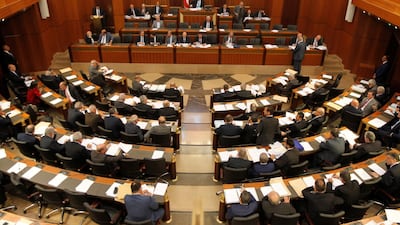Prominent Hezbollah MP Nawaf Al Moussawi was suspended for one year for insulting the memory of assassinated President-elect Bashir Gemayel in Parliament two weeks ago, a Hezbollah spokesman said.
Mr Gemayel was elected president of Lebanon in 1982 but was assassinated before he could take office, in a pivotal event during the 15-year Lebanese civil war.
Mr Al Moussawi’s comments shocked Parliament during debates about the new government’s policy statement when he said that President Michel Aoun had been elected to lead the country thanks to “the rifle of the resistance”, referring to Hezbollah, Lebanon’s powerful Iran-backed party.

The fact that Hezbollah is the only Lebanese party that did not surrender their arms after at end of the civil war in 1990 is a contentious issue in the country.
At the time it argued that it would only surrender its arms once it had recaptured all the Lebanese territory occupied by Israel.
Despite its successful guerrilla campaign forcing Israel’s withdrawal from southern Lebanon in 2000, it still occupies the Sheba Farms area and the northern portion of Ghajar village.
There are those who believe Hezbollah should be integrated into the Lebanese army and those who argue that its weapons are still essential to fight Israel.
Mr Aoun was elected late 2016 in part thanks to his 2006 alliance with Hezbollah.
But Mr Al Moussawi’s most damning remarks were at the end of his address when he said that at least Mr Aoun “did not get there with an Israeli tank”, in a stark comparison to Gemayel.
Lebanon and Israel are still technically at war, and Hezbollah fought Israel in 2006 during a 33-day war that killed 1,200 Lebanese, mainly civilians, as well as 120 Israeli soldiers and 44 Israeli civilians.
Gemayel’s son Nadim, an MP with the Kataeb party, called those comments "unacceptable" and rallied supporters in Beirut the same night, threatening to “take up arms”.
The Maronite Christian president-elect was close with Israel.
The day after his election on August 24, 1982, The New York Times wrote that: "As commander of the Phalangist Christian militias formally known as the Lebanese Forces, Mr Gemayel has made no secret of the military assistance his troops have received from Israel."
Mr Al Moussawi’s comments came in an angry reply to Sami Gemayel, Bashir’s nephew and another Kataeb MP, who had stated that Hezbollah controlled the government. The Kataeb, a former militia, has long been opposed to Hezbollah.

Hezbollah had just been given a third ministry for the first time since it joined the government in 2005, which was widely interpreted as a strong gain for the party. The Cabinet was formed in late January after nearly nine months of political wrangling.
A few days later, Hezbollah MP Mohammad Raad apologised for Mr Al Moussawi’s comments in the name of Hezbollah’s 13-member parliamentary bloc. News of his suspension was leaked to the Lebanese press late last week.
Mr Al Moussawi, who is fluent in French, English and Farsi, previously ran Hezbollah's weekly newspaper Al-Ahd and led the party's external relations office until 2009, when he was elected to Parliament.
“Mr Al Moussawi’s statements harmed the party’s interest, particularly its Christian alliance, so they needed to tame him and show that, unlike other Lebanese parties, they could punish their own cadres,” said Mohanad Hage Ali, author of a book on Hezbollah.
“It’s part of their attempt to repackage themselves since the last elections" in May 2018, he said.
To be seen criticising a president, even one who was politically opposed to the party, is bad for that party’s image.
Like many other Lebanese parties, Hezbollah has promised to fight corruption and increase transparency. Regardless of party affiliation prior to election as president, the candidate is supposed to represent all sects in the country.
In recent years, parties have tried to show that they have respect for the office even if there are issues with specific presidents.


